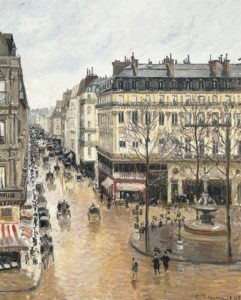California state lawmakers are pushing through legislation that will make art restitution easier for Holocaust survivors. In January, I wrote about a restitution case going through the American court system for over twenty years. The case centers around a Paris street scene by Camille Pissarro, currently in the hands of Madrid’s Thyssen-Bornemisza Museum, which a Holocaust survivor’s descendants are trying to have returned to them. In January, the 9th Circuit Court of Appeals in Pasadena, California, ruled that the museum, owned and operated by the Spanish government, could keep the painting. Their reasoning comes from their application of Spanish law over California law. In Spain, if you buy stolen property but do so in good faith without knowing it is stolen, you can keep it. Upset by the court’s decision, some California state lawmakers are trying to prevent cases like these.
In the appellate court’s decision in January, the panel of judges unanimously decided, “We conclude that, under the facts of this case, Spain’s governmental interests would be more impaired by the application of California law than would California’s governmental interests be impaired by the application of Spanish law.” According to current California law, stolen property must be returned to its rightful owner regardless of the circumstances. However, under Spanish law, if a previously stolen artwork is displayed in good faith for at least three years, whoever possesses it legally owns it. The Thyssen-Bornemisza Museum claims that they did not know that the Pissarro was sold under duress during the Holocaust. The descendants of Holocaust survivor Lilly Neubauer, who previously owned the Pissarro, dispute this.
To rectify the appellate court’s decision, on March 28th, state assemblymen Jesse Gabriel and Isaac Bryan, respectively representing California’s 46th and 55th assembly districts, introduced Assembly Bill 2867. The bill specifically pertains to the “recovery of artwork and personal property lost due to persecution” and would amend and add to the section of California’s Code of Civil Procedure relating to civil actions. It would specifically add to this section to specify that in cases where a California resident is involved in a civil suit “relating to title, ownership, or recovery of personal property […], California substantive law shall apply. This paragraph shall apply to all actions pending on the date this paragraph becomes operative or that are commenced thereafter, including any action in which the judgment is not yet final”. The bill also adds another paragraph specifying that a California resident may file a civil suit for damages pertaining to property “taken or otherwise lost as a result of political persecution.” According to Gabriel, “Respectfully, we think that the 9th Circuit got it wrong, and this law is going to make that crystal clear.” With the bill having bipartisan support, it shouldn’t be long before it makes its way through both houses of the state assembly.
Lilly Neubauer’s California-based descendants, who are involved in the lawsuit against the Thyssen-Bornemisza Museum, have expressed approval of the bill since its introduction this past Thursday. In the wake of the decision in January, the family filed for appeal. And with the new bill’s support, it won’t be long before the civil code’s latest additions will encounter their first test in the courts.

